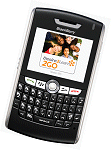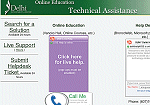What's Happening In Technology Sectors
:: NEWS
FIRST FULL-SCALE KUALI
LAUNCHES. Colorado State
University and San Joaquin Delta
College (CA) have launched Kuali
Financial System 3.0 on their campuses--
the first full-scale implementations
of the open source enterprise system.
The web-based system combines the
functions of transactional recording,
accounting, budgeting, online purchasing,
and credit card processing. Officials at both campuses reference Kuali
as a primary example of how institutions
can contain costs through innovation
and collaboration: "We were able
to implement state-of-the-art infrastructure
for a fraction of the cost of our
peers through a partnership with the
Kuali Foundation," reports Patrick
Burns, CSU's VP for IT and interim
dean of libraries, who notes that the
total cost for CSU's new system came
to less than $2 million. Raúl
Rodriguez, president of San
Joaquin Delta, adds, "The
money we saved by not buying
a proprietary system is money
that can now be spent where it
belongs-- on our students."
MOVING FORWARD WITH
eTEXTBOOKS. A new eTextbook
program at the University of
Wisconsin-Oshkosh College of Business
aims to make higher education
more affordable for students. The project,
funded by a two-year, $295,706
grant from the US Department of Education's
Fund for the Improvement of
Postsecondary Education, will allow
professors to create textbooks customized
to individual courses and
teaching styles. Core content will be
shared among classes in the same subject
area, with supplemental material
supplied by individual instructors.
While specific details about the eTextbook
delivery platform have not yet
been determined, a low-priced, print-on-
demand option will be made available
to students who prefer a hard
copy to the electronic version.
 EMBRACING MOBILE
ACCESS. This fall, more than
100 incoming students in the fulltime
MBA program at Canada's
Laurier School of Business &
Economics (ON) began using
BlackBerry smart phones as
part of their curriculum. The
school has implemented the
Desire2Learn 2Go mobile learning
application, enabling students
to view course details, communicate
with classmates, sign up for
study groups, and check grades, all via
their phones. Another Canadian institution
has gone the iPhone route: The
University of Saskatchewan recently
deployed iUSask, an application
designed for the iPhone and iPod Touch
that allows students to receive grades,
get campus news, access campus
maps, and utilize a self-service
question-and-answer tool powered
by IntelliResponse. And
stateside, Columbus State
University (GA) has integrated
Google Apps for
mobile devices with the
school's online, password protected
student information
system. With the new
Columbus State Mobile
App, students can use any web enabled
cell phone to securely view
information about academic status (such
as GPA, adviser contact, and grades),
class schedules, admissions documents,
financial information, campus shuttle
schedules, and more.
EMBRACING MOBILE
ACCESS. This fall, more than
100 incoming students in the fulltime
MBA program at Canada's
Laurier School of Business &
Economics (ON) began using
BlackBerry smart phones as
part of their curriculum. The
school has implemented the
Desire2Learn 2Go mobile learning
application, enabling students
to view course details, communicate
with classmates, sign up for
study groups, and check grades, all via
their phones. Another Canadian institution
has gone the iPhone route: The
University of Saskatchewan recently
deployed iUSask, an application
designed for the iPhone and iPod Touch
that allows students to receive grades,
get campus news, access campus
maps, and utilize a self-service
question-and-answer tool powered
by IntelliResponse. And
stateside, Columbus State
University (GA) has integrated
Google Apps for
mobile devices with the
school's online, password protected
student information
system. With the new
Columbus State Mobile
App, students can use any web enabled
cell phone to securely view
information about academic status (such
as GPA, adviser contact, and grades),
class schedules, admissions documents,
financial information, campus shuttle
schedules, and more.

IONA COLLEGE'S revamped Ryan Library is marrying technology
and library science on campus.
TECH-SAVVY LIBRARY. This
fall, Iona College (NY) opened its
redesigned and expanded Ryan Library,
with the goal of marrying technology
and library science on campus. The
63,800-square-foot space features individual
quiet study and group work/study
areas, dual-boot iMac workstations, networked
printers and scanners, and a
staff of reference librarians and technical
support available seven days a week.
The library and information technology
staffs have been integrated to help move
the library into the digital era: Library
staff members help students navigate
through research databases, answer
technical questions, plus conduct ongoing
training of faculty members in the
use of technology.
SIMPLIFIED NETWORK MANAGEMENT. Boise State University (ID) is using BlueCat's Domain Name
System/Dynamic Host Configuration
Protocol solution to centrally manage a
large and highly distributed campus
network. The school has a Class B IP
address space with 56 separate DHCP
Pools, 208 DNS Zones, and 22,000
host records, as well as 2,300 IP
phones. By automating the labor intensive
IP address monitoring and
management process, the BlueCat technology
has simplified network and services
administration and increased IT
infrastructure stability, making it easy
for faculty, staff, and students to instantly and securely access the university's
applications, devices, and portals
via e-mail, voice mail, or the web.
FOCUSING ON eLEARNING.
SunGard Higher Education and Datatel
have each announced partnerships with
eLearning solution providers: SunGard
HE is integrating its solutions with the
Epsilen eLearning environment, while
Datatel has signed an exclusive deal
with Moodlerooms. Both companies are
leveraging eLearning technology as a
key new facet of their portfolios of
products and services.

SUNY-DELHI is utilizing a variety of Web 2.0 tools
to facilitate IT support.
WEB 2.0 FOR USER SUPPORT.
SUNY-Delhi has developed a flagship
web page for user help and support that
utilizes a variety of Web 2.0 tools to
make it easy for users to get up-to-date
information, make live contact with
technicians, ask questions, submit help
tickets, and receive assistance. A customized
instant messaging widget
from Wimzi.com enables live chat; a
Google Voice widget provides a tollfree
way for users to call for help; and
technology from Dimdim provides
screen-sharing capability between
technicians and end users. Other features
include: a Twitter feed for up-to-the-
minute system updates; 24/7
self-service search of the school's
Atlassian Confluence knowledge base;
a podcast RSS feed for video tutorials;
an embedded Google Calendar; and a
Javascript help form.
SUPPORTING STUDENT
ACHIEVEMENT. Pearson and the
Career Colleges & Schools of Texas have announced a partnership to
improve retention and achievement for
students enrolled in job-training programs.
CCST member colleges and
schools now can utilize a customized
version of Pearson's MyFoundations-
Lab, an integrated set of developmental
reading, writing, and math
resources designed to engage and
motivate learners in a completely
online environment.
IDENTIFYING AT-RISK
STUDENTS. SunGard Higher Education,
Purdue University (IN), and
the Purdue Research Foundation have
collaborated to launch Signals, an
early intervention system that warns
students who may be under performing
in a course and facilitates faculty
intervention. Developed by Purdue,
the software monitors students'
behavior patterns and academic performance
to determine if they are at
risk of earning a low grade, and
allows faculty to suggest actions students
can take to improve their grade.
An intuitive stoplight icon provides a
visual warning to prompt students to
take action. Data from Signals will
feed into SunGard's Banner Enrollment
Management system, to help
create a complete picture of a student's
educational experience.
:: M & A, Etc.
ELLUMINATE ACQUIRES
SOCIAL NETWORK. Elluminate
has acquired Edtuit, the company that
developed the Elluminate-sponsored
LearnCentral social-learning network.
Launched this past June, LearnCentral
combines asynchronous social networking
with Elluminate's real-time
online communication, collaboration,
and education environment.
:: PEOPLE
 WIMBA TOP EXECS. Wimba has announced
the appointment of Carol Vallone as CEO. Vallone
has been Wimba's acting CEO for six months,
and brings to her role extensive experience as
WebCT's co-founder and former CEO. In addition,
Barb Ross and Karen Gage have joined the executive
team as co-COOs. Both execs spent time at
WebCT: Ross as co-founder and COO; Gage as
senior VP of marketing.
WIMBA TOP EXECS. Wimba has announced
the appointment of Carol Vallone as CEO. Vallone
has been Wimba's acting CEO for six months,
and brings to her role extensive experience as
WebCT's co-founder and former CEO. In addition,
Barb Ross and Karen Gage have joined the executive
team as co-COOs. Both execs spent time at
WebCT: Ross as co-founder and COO; Gage as
senior VP of marketing.
 EMBRY-RIDDLE DEAN. Ron Thomas has been
named dean of online instruction at Embry-Riddle
Aeronautical University (FL). His department provides
undergraduate and graduate courses worldwide
for a campus of over 38,000 students. In
addition, he will oversee a worldwide network of
online faculty-development programs, serving more than 4,000 full and
part-time faculty members.
EMBRY-RIDDLE DEAN. Ron Thomas has been
named dean of online instruction at Embry-Riddle
Aeronautical University (FL). His department provides
undergraduate and graduate courses worldwide
for a campus of over 38,000 students. In
addition, he will oversee a worldwide network of
online faculty-development programs, serving more than 4,000 full and
part-time faculty members.